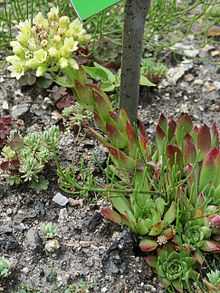Jovibarba heuffelii
| Jovibarba heuffelii | |
|---|---|
 | |
| Jovibarba heuffelii, at a botanical garden in Wroclaw, Poland | |
| Scientific classification | |
| Kingdom: | Plantae |
| (unranked): | Angiosperms |
| (unranked): | Eudicots |
| (unranked): | Core eudicots |
| Order: | Saxifragales |
| Family: | Crassulaceae |
| Genus: | Jovibarba |
| Species: | J. heuffelii |
| Binomial name | |
| Jovibarba heuffelii (Schott) Á. Löve & D. Löve | |
| Synonyms[1] | |
| |
Jovibarba heuffelii, common name Hen-and-chickens, as a plant species native to the Balkans and to the Carpathians in Europe but reportedly naturalized in Wisconsin and probably in other parts of North America. It grows on rocky outcrops.[2]
Jovibarba heuffelii is a perennial herb forming basal rosettes of succulent leaves that are ciliate along the margins. Flowering stalks are erect, succulent, up to 20 cm (8 inches) tall, bearing a cyme of up to 40 white to yellowish flowers. Each flower is up to 5 cm (2 inches) in diameter, with 6-7 fringed petals. Each plant is semelparous, meaning that it flowers only once, dying after its fruits mature.[2][3][4]
Some botanists treat the genus Jovibarba as part of the genus Sempervivum, but the Flora of North America separates it into its own genus.[2]
References
- ↑ Tropicos
- ↑ 2.0 2.1 2.2 Flora of North America v 8 p 170.
- ↑ Löve, Áskell, & Löve, Doris Benta Maria. Botaniska Notiser 114(1): 39. 1961.
- ↑ SMG Succulents